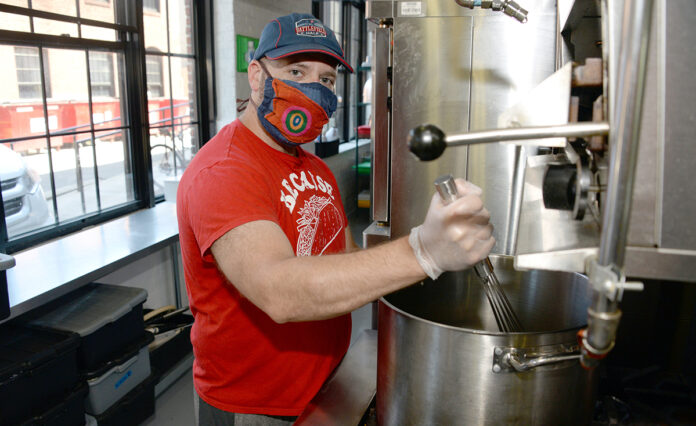Restaurants and other food businesses, like many small businesses, have high failure rates. How to get started in the business while learning the ropes? Incubator spaces and shared professional kitchens in Rhode Island allow a microbusiness to take root.
Such incubators for food businesses are continuing to provide support in the COVID-19 pandemic by sharing the cost of the most intensive financial need for a food business – a commercial-grade kitchen with all the equipment.
The Providence Kitchen Collaborative is the newest facility and the only significant shared facility in the capital city.
It joins other collaborative kitchens, including Hope & Main in Warren and Millrace Kitchen in Woonsocket. All have slightly different models, but the bottom line is similar. Food entrepreneurs lease time or space rather than investing in their own kitchen from the get-go.
The Providence Kitchen Collaborative is less than a year old, built as part of the Room & Works mill redevelopment on Cromwell Street. The collaborative now is used by six to eight small food businesses, as well as Knead Doughnuts.
Knead, by nature of its business, occupies the kitchen from early morning hours to about noon. For the rest of the day, a series of businesses sign up for time by the hour, giving them access to the professional-grade kitchen without having to buy their own equipment or lease an entire kitchen themselves.
The space at 55 Cromwell St. originally was occupied by another food incubator that closed about a year after its start. In March, Knead moved in, and along with all of the former occupant’s equipment inherited six to eight microbusinesses that were sharing the space.
‘We all sort of commiserate about how hard it is to be a business owner.’
JOSH BERNER, HG80 owner
Their rent became part of the financial justification for the expansion into such a large kitchen, said Adam Lastrina, who owns Knead.
“When we took the space over, it was already an incubator,” he said. “It was a very large space … made easier by having paying tenants.”
Without sharing the kitchen expense, a food business could easily have to invest $100,000 in kitchen equipment, he said.
A professional, 8-foot exhaust hood alone costs upward of $20,000 to $30,000. “And then you need fryers, mixers, a dishwasher, refrigeration, a range, walk-in space,” he said.
At Providence Kitchen Collaborative, the tenant mix is diverse.
Big Feeling LLC is an ice cream and sorbet maker. The Meat Magician is a hot dog cart that has unique hot dogs. Far West is a cocktail bar located on-site. Brown Paper Bounty LLC provides curated culinary table spreads. And HG80 is a food truck that specializes in unusual tacos.
HG80 owner Josh Berner explained: “I take your favorite meal and turn them into tacos. I do things like chicken parmesan tacos and buffalo wings tacos.”
A longtime employee in the food industry, he dreamed for years of starting his own business.
He finally did so about three years ago, after moving to Providence.
“And it’s not easy,” Berner said.
Due to limited space on the truck, he needed access to a kitchen for prep work and for cooking up to 20 pounds of chicken and other meats.
After signing an agreement to move into the Cromwell Street kitchen, under the previous incubator, he scrambled to find another location when it closed. He ended up at Millrace Kitchen in Woonsocket. But driving his food truck back and forth from Woonsocket to his parking-base at Armory Animal Hospital in Providence became too arduous.
“It’s not fuel efficient and it’s terrifying,” he said. “It’s a very heavy, very slow, loud piece of machinery.”
When Knead took over the Room & Works kitchen space, Berner moved back. Now he has a 10-minute walk to the kitchen, where he uses the commissary space for chopping vegetables, storing items, cooking his ingredients and organizing his day.
The pandemic has thrown his business model into disarray. Although food trucks were allowed to remain open, the mobile eateries are designed to go where hungry crowds are. During the COVID-19 crisis, crowds have been discouraged.
Berner estimates that his sales are down 90% from a year ago. Before the pandemic, he had about a 20% year-over-year increase in sales. He has stopped going to the Thursday lunch events at Kennedy Plaza in Providence because the office crowds have not returned. He is hoping a new spot – he has a space at Narragansett Town Beach – proves to be more lucrative.
Other food microbusinesses are in similar situations. Any business that depends on catering to large events is taking a hit due to crowd-size limits.
The camaraderie of the collective kitchen is helpful, Berner said. They are using staggered schedules to make sure they have space and time that they need, but the small-business owners have become friendly, he said.
“We all sort of commiserate about how hard it is to be a business owner,” he said.
And sometimes the help is more tangible.
“If one of us is out of onions, or something, you can borrow an onion. It’s like going to the neighbor and asking for a cup of sugar,” Berner said.
Mary MacDonald is a PBN staff writer. Contact her at Macdonald@PBN.com.












